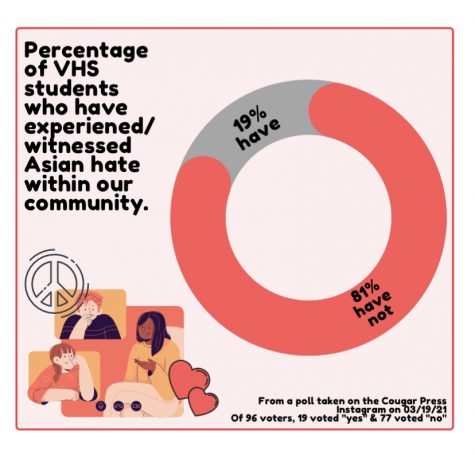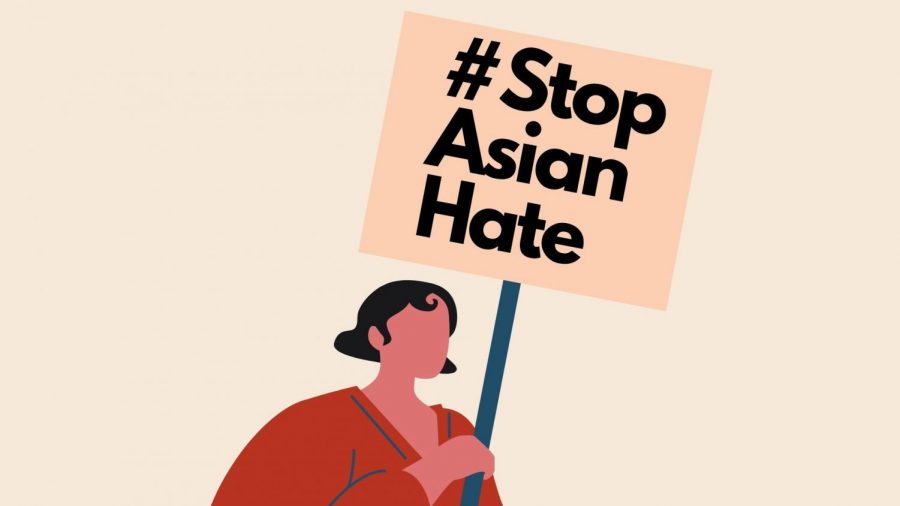How social media advocates for Asian lives
Infographic style images, such as the one above, have been used on social media to spread awareness about Asian hate. The hashtag #StopAsianHate has over 460K tags on Instagram alone. Graphic by: Sophia Nacu
May 27, 2021
Asians have been a target of hate crimes recently, how do we advocate for change?
Anti-Asian hate crimes are not a new phenomenon, they’ve been happening for centuries. Early documented acts of racism towards Asians in the United States first occurred in the 1850’s during the case of People v. Hall. This case was centered around a white man, George Hall, who shot and killed a Chinese woman, Ling Sing. The California Supreme Court made a ruling that people of Asian descent could not testify against Caucasians in court.
In recent years, we have also seen former United States President, Donald Trump publicly display acts of racism towards the Asian community. “He wants everybody to understand, and I think that we need Americans to understand, that the virus originated in China,” announced Trump’s counselor, Kellyanne Conway, after Trump called COVID-19 the “kung-flu.” Trump made it clear that he blamed China for the spread of COVID-19, and with this public accusation, people have applied this hate and judgement toward their own views on Asia, especially China, and have since then targeted those of Asian descent. Even celebrities have taken a stand, talk show host Stephen Colbert referenced Trump and his “kung flu” comment “And that matches up neatly with the person who, for nearly a year, did this,”
There has been a 145 percent increase of Asian hate crimes with nearly 3,800 instances of discrimination against Asians in the United States, mostly women in 2020, according to NBC News. After the shooting in Atlanta, Georgia where a man killed six Asian women, one white man and one white woman, word has been spread educating people about these targeted attacks throughout news outlets, podcasts and politicians but the most important source we might have could be social media.

Adolescents in our community have spoken up about this issue through their social media platforms, because let’s face it, news gets around much faster these days. People are becoming more educated each and every day and we owe thanks to social media for that. Infographics educating people about the spike in anti-Asian hate crimes, promoting resources to help, GoFundMe and more have been circling around Instagram and have been reposted on countless Instagram stories in the past few weeks. Information that spreads awareness of the inequalities that our society might have is always readily accessible, and more and more people are starting to use their social media platforms to educate themselves and others.
“When I go on my phone I see so many posts about important topics that I think everyone should be aware of,” explained sophomore Sloane Feingold, who thinks social media is a good way to spread information especially during the COVID-19 pandemic. Feingold said, “With regulations about social distancing, it is important to be a good activist outside, [as well as] protests and face to face discussions with people.” When asked if she felt educated on the rise of Asian-American hate crimes, Feingold responded with, “[Yes] because I read the things people put out and share what needs to be shared and make sure that I am doing whatever I can to help.”
When the question of false news was raised, junior Breahna Roark thought that it was important to acknowledge this problem in social media. Roark said, “While social media can be a very impactful and informative way to spread information, it can also be a very dangerous way to read into a false narrative regarding the topics that can be speculated around leaving you to wonder– what is the truth?”
“I don’t really think everyone needs to know how you feel,” shared sophomore Emma Hrabak. On social media, you only post what you want people to see; you would only post things you believe in or post your opinions on these social justice problems. Hrabak continued, “You deserve an opinion but you don’t need to express how you feel about everything that is happening in the world.”
Social media, especially Instagram, has been vital for informational sources for the Stop Asian Hate movement and has educated hundreds of people, including me. Many social media feeds have been flooded with infographics, GoFundMe and ways to help and support Asian-Americans. Social media is effective because many people are active on it. Social media has not only been educating and spreading awareness on the anti-Asian-American hate crimes, but it also provides posts which show how to support your Asian friends and Asian-owned businesses.





















